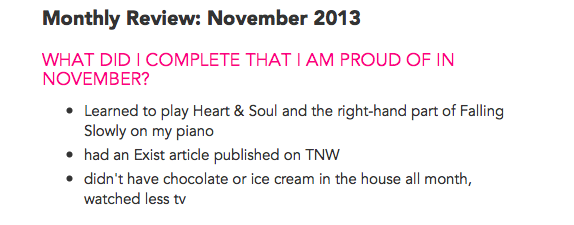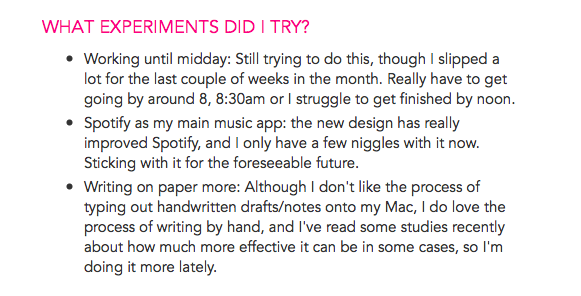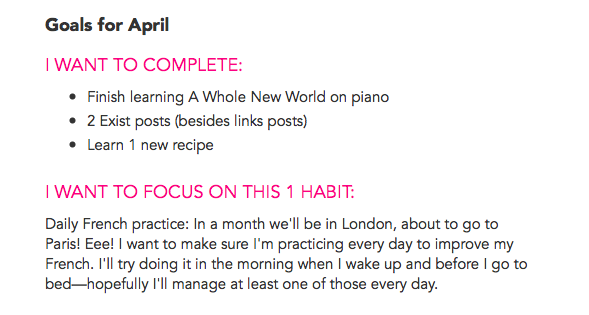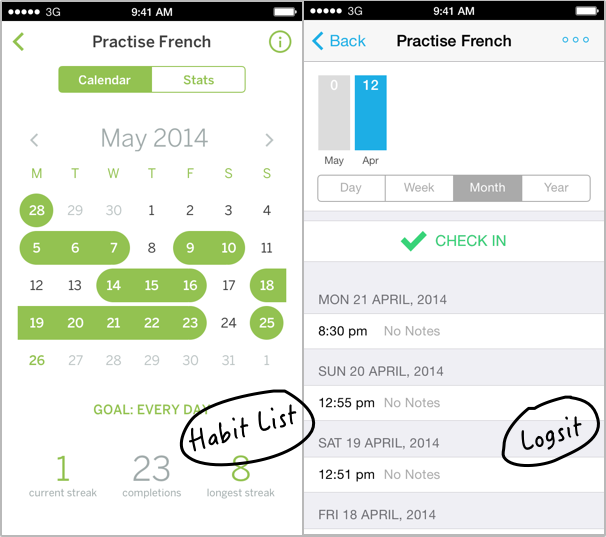26 May 2014
By Belle

My monthly review
Ten months ago I started a new process of reviewing my goals and habits every month. I was originally inspired by Chris Guillebeau, who does an in-depth annual review of his life. I wasn't ready for such a big undertaking, so a monthly review seemed like a good place to start.
I did my first review in July 2013. Since then I've made some minor changes, but for the most part the format is the same. Right now, these are the sections each review includes:
What did I complete this month that I'm proud of?
This is where I take the time to reflect on the past month and what I've accomplished. Answers to this question can be as far-ranging as learning to code, work tasks, progress in learning to play piano, or doing something nice for a friend. Each item has to be complete, but it doesn't need to be a goal I set for myself.
Some past answers have included going on holiday to Europe, learning to make vegetable soup and building my first desktop app in Python.

What one habit did I focus on this month, and how did it go?
This is usually a daily habit I'm trying to build. I've learned to keep it to just one, and to make it very simple so I can focus on building the habit itself.
These have included practising French every day in the month before my recent holiday to Paris, writing every morning and reading a book before bed every night—this last one went so well that I do it most nights without a reminder now, three months after it was my focus habit.
What experiments did I try this month?
I added this section more recently to serve as both a record of personal experiments I had tried and a reminder to reflect on their results. Answers to this question have included writing on paper more often, working until midday and switching to Spotify from Pandora (to lose the cognitive overhead of listening to shuffled music constantly). No doubt this section will continue to be filled, as I can't help trying new tweaks constantly.

At this point, my reflection on the past month is done and I start looking ahead to my goals for the next month. This section is essentially a prediction of what I want next month's review to look like.
I want to complete:
I try to list 3-5 things in this section that are achieveable in a month. They vary from small tasks to big projects, and I usually include one or more work-related items. Past responses have included clean the oven, learn a new recipe and file my taxes.

I want to focus on this one habit:
Unsurprisingly, this is where I pick a daily habit to focus on building over the next month. This was partly inspired by something the Buffer team does: each week Buffer employees choose something they want to improve and share their progress with the team.
Like Buffer improvements, I can repeat the same habit if I didn't quite get it right last month, or I can choose a new one each time.
Long-term:
This is really just a holding place for reminders of long-term goals I may not be actively working towards this month. I might actually cut this section in my next review, since it's contained the exact same three items in ever review so far: learn French, learn Python and learn piano.
Review are fairly common in a work context, but I hadn't really thought about doing a personal one until I read about Chris Guillebeau's annual review. I've since come across Buster Benson's monthly reports, wherein he notes his progress towards a single goal. Buster also includes notes of "quality moments" in his life for the past month, and "self-declared badges", e.g. "Debt Free Badge". Both are great ideas that I might incorporate into my own review (Buster also does an annual review on his birthday which is great for further inspiration).
It might seem strange to look to other people's examples for your own personal review but it can take a surprising amount of trial-and-error to get it right. Your interests and priorities will change over time, of course, and change your review with them, but even in just ten months I've refined my own review process after trying it out and exploring what how other people approach theirs.
Knowing what to include in your review, in my opinion, is best informed by what you want to get out of the process (like so many things we do).
What I've learned so far
I'll keep doing a monthly review as long as I find it useful, but I've already found that I've learned some lessons from completing them.
Keep it visible
I use Day One to write and store my reviews, which works well—especially since I can keep them organised with tags. It's not very visible, though. After a couple of months I realised writing my goals into Day One wasn't enough to help me remember them all month.
I've now taken to writing out my daily habit and goals I want to accomplish for the month in the front of my current notebook, which sits on my desk permanently. A sticky note on the wall above my computer would probably work even better.
Keep it simple
Sticking to just one daily habit makes it a lot easier to remember to do it every day. It's also easier to build a habit that happens at the same time every day when there's only one to worry about.
When my daily habit was to read every night before bed, I didn't even set a goal of how much I had to read; it just had to be a book. Leaving my book beside my bed (keep it visible!) and having no other habits to focus on made it easy to build up a regular reading habit.
Track your progress
At first I would answer my review question about my daily habit with some commentary like, "I did this on most days of the month, it went pretty well!" Now I try to keep track of my progress more objectively, by checking off the habit in an app each day when it's completed.
I like both Habit List and Logsit for this, because they make it easy to see your success rate at the end of the month.

Keep it up
I'm still learning about how to get the most out of my reviews, but the process itself is a good way to encourage regular reflection. I'm not much of a journaller or diary keeper, but I do add personal thoughts to my reviews and I think it will be fun to read back over them in years to come.
We're building Exist to provide the real insights that come from hidden connections in your data. We analyse your data, find patterns, and serve up new insights.
Sign up for an Exist account to start tracking and understanding your life.
Subscribe Keep up to date with the Exist blog. Delivered to your inbox.